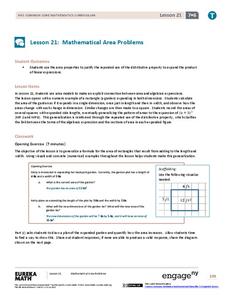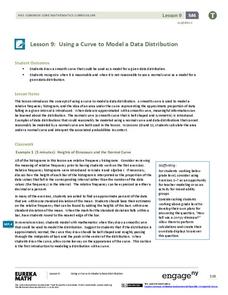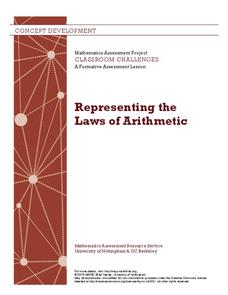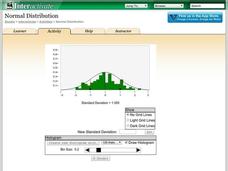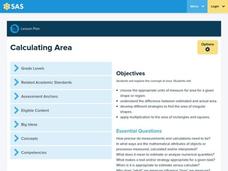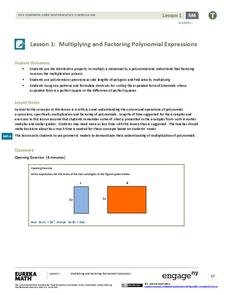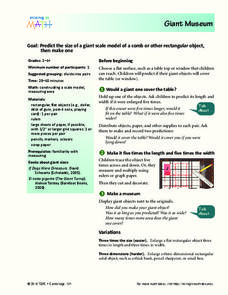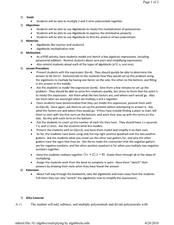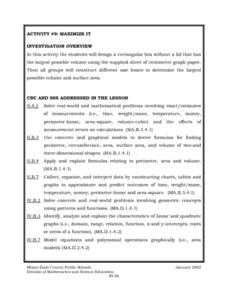PHET
Area Model Introduction
Provide two views of multiplication. The introduction to an area model application has two modes. One mode shows the area of simple multiplication up to 12 by 12. The second mode shows how area models can be partitioned leading to the...
Center for Mathematics and Technology
Whole Numbers: Using an Area Model to Explain Multiplication
There are many ways to work through a multiplication problem. Using an area model, kids complete several worksheets with different types of multiplication problems, including multiplying by ten, and explain how the new strategies differ...
EngageNY
Mathematical Area Problems
Teach the connection between area models and the distributive property through problem-solving. The 22nd activity in a series of 29 explains the distributive property graphically. Learners build area models from word problems and convert...
Curriculum Corner
Area and Perimeter
Get third graders excited to work find area and perimeter of unit squares, rectangles, and irregular shapes. A 36-page packet comes with task cards, graphic organizers, practice worksheets, printables with squares, exit tickets, and word...
West Contra Costa Unified School District
Factoring Quadratic Expressions
Factor in different strategies in a lesson plan for factoring quadratics. Young mathematicians first create tables and area models to factor quadratic trinomials into two binomials by guess and check. Learners then investigate how they...
EngageNY
The Multiplication of Polynomials
If you can multiply multi-digit integers, you can multiply polynomials. Learners use an area model to compare multiplying numbers to multiplying polynomials. They progress to using the distributive property.
EngageNY
Using a Curve to Model a Data Distribution
Show scholars the importance of recognizing a normal curve within a set of data. Learners analyze normal curves and calculate mean and standard deviation.
Ohio Department of Education
Fraction Models - Grade Three
Explore fractions using different manipulatives and illustrations. Your class can create a variety of models of fractions and mixed numbers with drawings and manipulatives. They then work to compare fractions, mixed numbers, and whole...
Mathematics Assessment Project
Representing the Laws of Arithmetic
Sixth graders connect numerical expressions to geometric area. They first complete an assessment task requiring them to identify area models for numerical expressions. Learners then participate in an activity to match area models to...
Curated OER
The Distributive Property
Students use a visual to introduce the Distributive Property. The lesson is chronologically numbered and follows a distinct plan. The class works with the teacher to complete the lesson. The plan is not written in a traditional way, but...
Shodor Education Foundation
Normal Distribution
Does the size of the bin matter? The resource allows pupils to explore the relationship between the normal curve and histograms. Learners view histograms compared to a normal curve with a set standard deviation. Using the interactive,...
Pennsylvania Department of Education
Multiplication Using Arrays
Explore the concept of multiplication by using arrays. Classmates use arrays to gain a better understanding of multiplication. They break arrays apart to model the distributive property of multiplication over addition. The relationship...
EngageNY
Multiplying and Factoring Polynomial Expressions (part 1)
Polynomial multiplication and factoring go hand in hand. Why not teach them together. This resource begins with an area model for distributing a monomial and then connects the process to factoring the GCF. Learners then advance to...
Science Matters
Spaghetti Fault Model
Does increasing the pressure between two moving plates provide a stabilizing force or create more destruction? The hands-on lesson encourages exploration of strike-split fault models. The sixth lesson in a 20-part series asks...
Curated OER
Giant Museum
Scholars make a giant scale model of an object. They will take a regular item and enlarge it to five times its length and width. They attempt this same concepts with a 3D model.
EngageNY
Normal Distributions (part 2)
From z-scores to probability. Learners put together the concepts from the previous lessons to determine the probability of a given range of outcomes. They make predictions and interpret them in the context of the problem.
Concord Consortium
Deformed Electron Cloud
Dispel the misconception that atoms are always little round balls! Illustrate changes in the electron cloud with an entertaining interactive. Pupils push and pull on the cloud by altering the charge on plates located on either side of...
Curated OER
Students Multiply Polynomials
Factor polynomial functions that have two and three terms. Using Algeblocks, your class will create models to show their understanding of these concepts.
Curated OER
Windmill of Your Mind - Distributed Energy Goes to School
Students research the possibility and feasibility of installing a wind-turbine distributed energy system for their school. They conduct research, watch an online video, analyze the cost of the project and examine the benefits, and write...
Curated OER
Calculating Areas of Rectangles
For this geometry worksheet, learners calculate the areas of rectangles. They use the formula for area of a rectangle.
Curated OER
Maximize It!
Students design a rectangular box without a lid that has the largest possible volume using the supplied sheet of centimeter graph paper. They work in groups to construct different size boxes to determine the largest possible volume and...
Shodor Education Foundation
Overlapping Gaussians
Adjust the overlap to compare probabilities. Using sliders, learners adjust the shape of two Gaussian curves. The interactive calculates the area of the left tail for one curve and the right tail for the other. Pupils set the interactive...
Mascil Project
Design a Parking Garage
Parking structures don't build themselves. Investigate the process of designing and planning the construction of a parking garage. After considering the factors that must go into the design, scholars create their own models from a...
Shodor Education Foundation
Algebra Quiz
Reviewing the process of solving equations is as easy as one click of a button. Scholars solve linear and quadratic equations by using a helpful interactive. The computer app automatically scores responses, providing immediate feedback...




